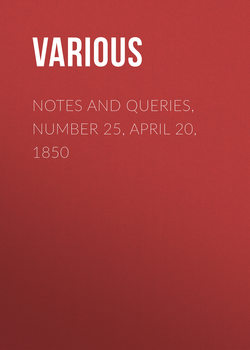Читать книгу Notes and Queries, Number 25, April 20, 1850 - Various - Страница 2
NOTES
ROGER BACON: HINTS AND QUERIES FOR A NEW EDITION OF HIS WORKS
ОглавлениеVictor Cousin, who has been for many years engaged in researches on the scholastic philosophy, with the view of collecting and publishing such of its monuments as have escaped the diligence of scholars, or the ravages of time, has lately made the discovery in the library at Douay of a copy of an inedited MS. of Roger Bacon, entitled Opus Tertium, of which but two or three other copies are known to exist; and has taken occasion, in some elaborate critiques, to enter, at considerable length, into the history and character of Roger Bacon and his writings.1 The following is a summary of part of M. Cousin's observations.
The Opus Tertium contains the author's last revision, in the form of an abridgment and improvement, of the Opus Majus; and was drawn up at the command of Pope Clement IV., and so called from being the third of three copies forwarded to his holiness; the third copy being not a fac-simile of the others, but containing many most important additions, particularly with regard to the reformation of the calendar. It also throws much light on Bacon's own literary history and studies, and the difficulties and persecutions he had to surmount from the jealousies and suspicions of his less-enlightened contemporaries and rivals. The Opus Tertium, according to the sketch given of its contents by Bacon himself, is not complete either in the Douay MS. or in that in the British Museum, several subjects being left out; and, among others, that of Moral Philosophy. This deficiency may arise, either from Bacon not having completed his original design, or from no complete MS. of this portion of his writings having yet been discovered. M. Cousin says, that the Opus Tertium, as well as the Opus Minus, is still inedited; and is only known by what Jebb has said of it in his preface to the Opus Majus. Jebb quotes it from a copy in the Cottonian Library, now in the British Museum; and it was not known that there was a copy in France, till M. Cousin was led to the discovery of one, by observing in the Catalogue of the public library of Douay, a small MS. in 4to. with the following title, Rog. Baconis Grammatica Græca. Accustomed to suspect the accuracy of such titles to MSS., M. Cousin caused a strict examination of the MS. to be made, when the discovery was communicated to him that only the first part of the MS. consisted of a Greek grammar, and that the remaining portion, which the compiler of the Catalogue had not taken the trouble to examine, consisted of many fragments of other works of Bacon, and a copy of the Opus Tertium. This copy of the Opus Tertium is imperfect, but fortunately the deficiencies are made up by the British Museum copy, which M. Cousin examined, and which also contains a valuable addition to Chapter I., and a number of good readings.
The Opus Majus, as published by Jebb, contains but six parts; but the work in its complete state had originally a seventh part, containing Moral Philosophy, which was reproduced, in an abridged and improved state, by the renowned author, in the Opus Tertium. This is now ascertained, says M. Cousin, with unquestionable certainty, and for the first time, from the examination of the Douay MS.; which alludes, in the most precise terms, to the treatise on that subject. Hence the importance of endeavouring to discover what has become of the MS. Treatise of Moral Philosophy mentioned by Jebb, on the authority of Bale and Pits, as it is very likely to have been the seventh part of the Opus Majus. Jebb published the Opus Majus from a Dublin MS., collated with other MSS.; but he gives no description of that MS., only saying that it contained many other works attributed to Bacon, and in such an order that they seemed to form but one and the same work. It becomes necessary, therefore, to ascertain what were the different works of Bacon included in the Dublin MS.; which is, in all probability, the same mentioned as being in Trinity College, in the Catalogi Codicum Manuscriptorum Angliæ et Hiberniæ in unum Collecti: Folio. Oxon, 1697.
According to this Catalogue, a Treatise on Moral Philosophy forms part of Roger Bacon's MSS. there enumerated; and if so, why did Jebb suppress it in his edition of the Opus Majus? Perhaps some of your correspondents in Dublin may think it worth the trouble to endeavour to clear up this difficulty, on which M. Cousin lays great stress; and recommends, at the same time, a new and complete edition of the Opus Majus to the patriotism of some Oxford or Cambridge Savant. He might well have included Dublin in his appeal for help in this undertaking; which, he says, would throw a better light on that vast, and not very intelligible monument of one of the most independent and greatest minds of the Middle Ages.
J.M.
Oxford, April 9th.
1
See Journal des Savants, Mars, Avril, Mai, Juin, 1848.
